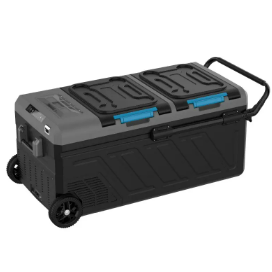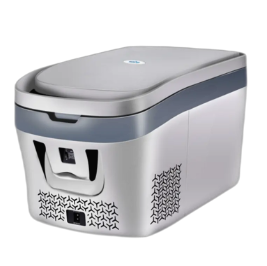Troubleshooting Common Compressor Fridge Issues
 A malfunctioning compressor fridge can disrupt your daily life. It may leave you frustrated as food spoils and repair costs pile up. Addressing these issues quickly ensures your fridge operates efficiently and prevents further damage. Many common problems stem from simple causes that you can resolve with basic troubleshooting. By identifying the root of the issue, you save time and avoid unnecessary expenses. Understanding how your compressor fridge works empowers you to maintain it effectively and keep it running smoothly.
A malfunctioning compressor fridge can disrupt your daily life. It may leave you frustrated as food spoils and repair costs pile up. Addressing these issues quickly ensures your fridge operates efficiently and prevents further damage. Many common problems stem from simple causes that you can resolve with basic troubleshooting. By identifying the root of the issue, you save time and avoid unnecessary expenses. Understanding how your compressor fridge works empowers you to maintain it effectively and keep it running smoothly.
Key Takeaways
• Regularly clean the condenser coils every six months to prevent overheating and ensure efficient operation.
• Maintain proper spacing around your fridge to allow for adequate ventilation, which helps the compressor function optimally.
• Test and replace faulty components like the thermostat, start relay, or capacitor to resolve startup issues quickly.
• Address unusual noises by tightening loose parts and leveling the fridge to minimize vibrations.
• Monitor and maintain the correct internal temperature of your fridge to prevent excessive wear on the compressor.
• Seek professional help for persistent issues or signs of severe damage to ensure safe and effective repairs.
• Incorporate preventive maintenance into your routine to extend the lifespan of your compressor fridge and avoid costly repairs.
Overheating Compressor Fridge

An overheating compressor fridge can signal underlying issues that need your attention. Ignoring these problems may lead to costly repairs or even permanent damage to your appliance. Understanding the causes and solutions helps you address the problem effectively.
Causes of Overheating
Dirty Condenser Coils
Dust and debris often accumulate on the condenser coils over time. These coils play a crucial role in releasing heat from your fridge. When they are dirty, the heat cannot escape efficiently, causing the compressor to overwork and overheat.
Poor Ventilation Around the Fridge
Your compressor fridge requires adequate airflow to function properly. Placing it too close to walls or other objects restricts ventilation. This lack of space traps heat, forcing the compressor to work harder than necessary.
Faulty Thermostat or Temperature Control
A malfunctioning thermostat or temperature control can cause the compressor to run continuously. This constant operation generates excessive heat, which may lead to overheating and potential damage.
Solutions for Overheating
Clean the Condenser Coils Regularly
Inspect the condenser coils every few months. Use a vacuum or a coil brush to remove dust and debris. Keeping the coils clean ensures efficient heat dissipation and prevents the compressor from overheating.
Ensure Proper Spacing for Ventilation
Position your compressor fridge at least a few inches away from walls or other appliances. This spacing allows air to circulate freely around the unit, helping it maintain an optimal temperature.
Test and Replace the Thermostat if Needed
If you suspect the thermostat is faulty, test it using a multimeter. A defective thermostat should be replaced immediately to prevent the compressor from running excessively. This simple fix can restore your fridge’s efficiency.
By addressing these issues, you can prevent your compressor fridge from overheating and extend its lifespan. Regular maintenance and timely troubleshooting keep your appliance running smoothly and efficiently.
Compressor Fridge Fails to Start
A compressor fridge that refuses to start can disrupt your routine and lead to spoiled food. Identifying the root cause of the problem helps you take the right steps to restore its functionality. Let’s explore the common reasons behind startup failure and how you can address them effectively.
Common Reasons for Startup Failure
Faulty Start Relay or Capacitor
The start relay and capacitor play a crucial role in powering the compressor. A malfunction in either component prevents the compressor from starting. You might notice clicking sounds or no response at all when the fridge tries to start.
Electrical Supply Issues
An unstable or interrupted power supply can stop your compressor fridge from functioning. Loose connections, tripped circuit breakers, or damaged power cords often cause these issues. Without a steady electrical flow, the compressor cannot operate.
Internal Compressor Damage
Internal damage to the compressor itself is a more serious issue. Worn-out parts or mechanical failures within the compressor can prevent it from starting. This type of damage usually requires professional attention.
Fixes for a Non-Starting Compressor
Test and Replace the Start Relay or Capacitor
Inspect the start relay and capacitor for signs of wear or damage. Use a multimeter to test their functionality. If either component fails the test, replace it with a compatible part. This simple fix often resolves startup problems.
Check the Power Supply and Circuit Breaker
Examine the power cord for visible damage. Ensure the plug is securely connected to the outlet. Check your home’s circuit breaker to confirm it hasn’t tripped. Restoring a stable power supply can get your compressor fridge running again.
Consult a Professional for Internal Damage
If the compressor still doesn’t start after addressing external issues, internal damage might be the cause. Contact a qualified technician to inspect and repair the compressor. Attempting to fix internal components on your own could worsen the problem.
By understanding these common causes and solutions, you can troubleshoot a non-starting compressor fridge with confidence. Addressing the issue promptly ensures your appliance remains reliable and efficient.
Unusual Noises from the Compressor Fridge
Unusual noises coming from your compressor fridge can be alarming. These sounds often indicate underlying issues that need your attention. Identifying the source of the noise helps you take the right steps to resolve the problem and maintain your fridge’s performance.
Causes of Noise
Loose or Damaged Components
Loose screws, bolts, or other components inside the fridge can create rattling or clanking sounds. Over time, vibrations from regular operation may loosen these parts. Damaged components, such as fan blades or brackets, can also contribute to the noise.
Worn-Out Compressor Motor
A worn-out compressor motor often produces a loud humming or buzzing sound. This happens when the motor struggles to function due to age or wear. Ignoring this issue may lead to further damage and costly repairs.
Vibrations Due to Improper Leveling
If your fridge is not level, it may vibrate excessively during operation. These vibrations can cause knocking or thumping sounds. Uneven flooring or improper placement of the fridge often leads to this problem.
How to Address Noise
Tighten or Replace Loose Parts
Inspect the fridge for loose screws, bolts, or other components. Use a screwdriver or wrench to tighten them securely. If you find damaged parts, replace them promptly to eliminate the noise and prevent further issues.
Inspect and Replace the Motor if Necessary
Listen closely to the compressor motor. If the noise comes from this area, the motor may be worn out. Contact a professional technician to inspect the motor. Replacing a faulty motor ensures your compressor fridge operates quietly and efficiently.
Level the Refrigerator to Reduce Vibrations
Check if your fridge is sitting evenly on the floor. Use a spirit level to confirm its position. Adjust the leveling feet or place shims under the fridge to stabilize it. Proper leveling minimizes vibrations and reduces noise.
Addressing unusual noises promptly keeps your compressor fridge running smoothly. Regular inspections and maintenance help you avoid long-term damage and ensure a quieter operation.
Preventive Maintenance for Compressor Fridge
Preventive maintenance ensures your compressor fridge operates efficiently and avoids unexpected breakdowns. By following simple upkeep practices, you can extend the lifespan of your appliance and maintain its performance.
Regular Maintenance Practices
Clean Condenser Coils Every 6 Months
Dust and debris accumulate on the condenser coils over time, reducing their ability to release heat. This buildup forces the compressor to work harder, which can lead to overheating or failure. Use a vacuum or a coil brush to clean the coils every six months. Regular cleaning improves energy efficiency and prevents unnecessary strain on the compressor.
Check and Maintain Proper Fridge Temperature
Maintaining the correct temperature inside your fridge is essential for its performance. Use a thermometer to ensure the fridge stays between 37°F and 40°F, while the freezer should remain at 0°F. Incorrect temperatures can cause the compressor to overwork, leading to wear and tear. Adjust the thermostat as needed to keep the appliance running smoothly.
When to Call a Professional
Persistent Issues Despite Troubleshooting
If your fridge continues to malfunction after you’ve tried basic troubleshooting, it’s time to seek professional help. Persistent problems, such as frequent cycling or failure to cool, may indicate deeper issues that require expert attention. A technician can diagnose and resolve these problems effectively.
Signs of Severe Compressor Damage
Unusual noises, excessive heat, or complete failure to start often signal severe compressor damage. Attempting to fix these issues on your own can worsen the problem. Contact a qualified technician to inspect and repair the compressor. Professional intervention ensures the safety and longevity of your appliance.
By incorporating regular maintenance into your routine and knowing when to call a professional, you can keep your compressor fridge in excellent condition. Preventive care not only saves you money on repairs but also ensures your appliance remains reliable for years to come.
________________________________________
Addressing issues like overheating, startup failure, and unusual noises ensures your compressor fridge operates efficiently. Regular maintenance, such as cleaning condenser coils and checking the thermostat, prevents future problems and extends the appliance’s lifespan. For complex or unresolved issues, seeking professional help guarantees proper repairs and avoids further damage. With consistent care and timely troubleshooting, you can rely on your compressor fridge to keep your food fresh and your kitchen running smoothly for years to come.
Post time: Nov-22-2024

